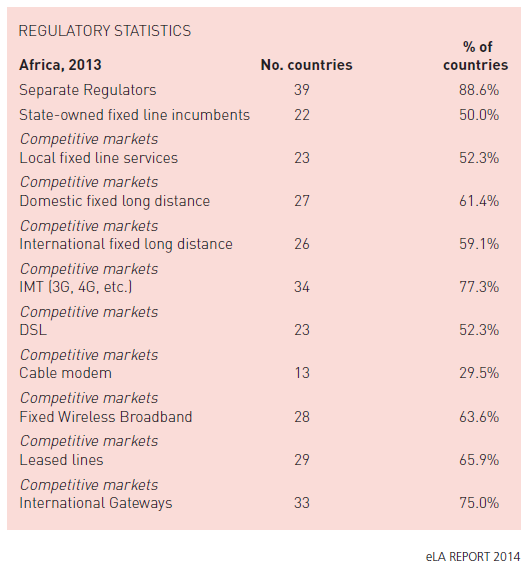Three-quarters of African markets have telecoms competition – even then the playing field is not always level
The annual eLearning Africa report may provide deep analysis into the state of how ICT is benefiting education across Africa, but it also contains information about African telecoms competition. More specifically, an exclusive interview with Brahima Sanou, Director of the Telecommunication Development Bureau of the International Telecommunication Union, highlights how competitive African mobile and Internet markets were in 2013. As Mr. Sanou states, most African governments are taking steps to enable more advanced ICT business. Initial reforms are establishing an independent regulator, privatizing the incumbent, and liberalizing the overall market. Nations that have already liberalized the telecoms market are enabling new policies, legal frameworks, and regulatory initiatives to bring more affordable services to the masses.
Of course, not all governments are working at the same pace. Some have yet to establish a telecoms regulator and many lack competitive mobile markets. An absence of competition only hurts consumers; monopolies generally have high prices and poor impetus to innovate.
The vast majority of African nations (89%) indeed have a separate telecommunications regulator who manages licensing, spectrum allocation, and quality of service, to name a few. Most (though not all) regulators are independent of the government and roughly 75% have strong enforcement power. Having an ICT regulator is nearly a requirement for securing greater investment in ICT as it shows national commitment to creating a positive business environment.
Looking at advanced mobile markets (those with 3G or LTE technology) we find 34 African markets (77%) to have competition among at least two providers. Slightly fewer (28 markets) have competitive fixed wireless broadband markets. Still, 15% of African countries have opened mobile broadband competition in the past 7 years which has greatly helped to grow mobile subscriptions.
On this note, it’s worth pointing out that although competition exists, only half of incumbent operators are partially or fully privatized. In other words, the playing field is still not level even if competition technically exists. Also importantly, only 75% of international gateways (33) are deemed competitive. As Mr. Sanou describes, the one-quarter of African nations have an incumbent who “maintains exclusive control over all legal international traffic, both incoming and outgoing, sets monopoly prices and keeps all international traffic revenue. Where incumbents follow a low-volume/high price model, the diffusion of ICTs and the intensity of their use is likely to remain limited because services are too expensive for consumers.”
Source: Beukes-Amiss, M., 2014. Knight of the networks – an interview with ITU’s Brahima Sanou. In: Elletson, H. and MacKinnon, A. (eds) 2014. The eLearning Africa Report 2014, ICWE: Germany.













 Twitter
Twitter Facebook
Facebook Pinterest
Pinterest